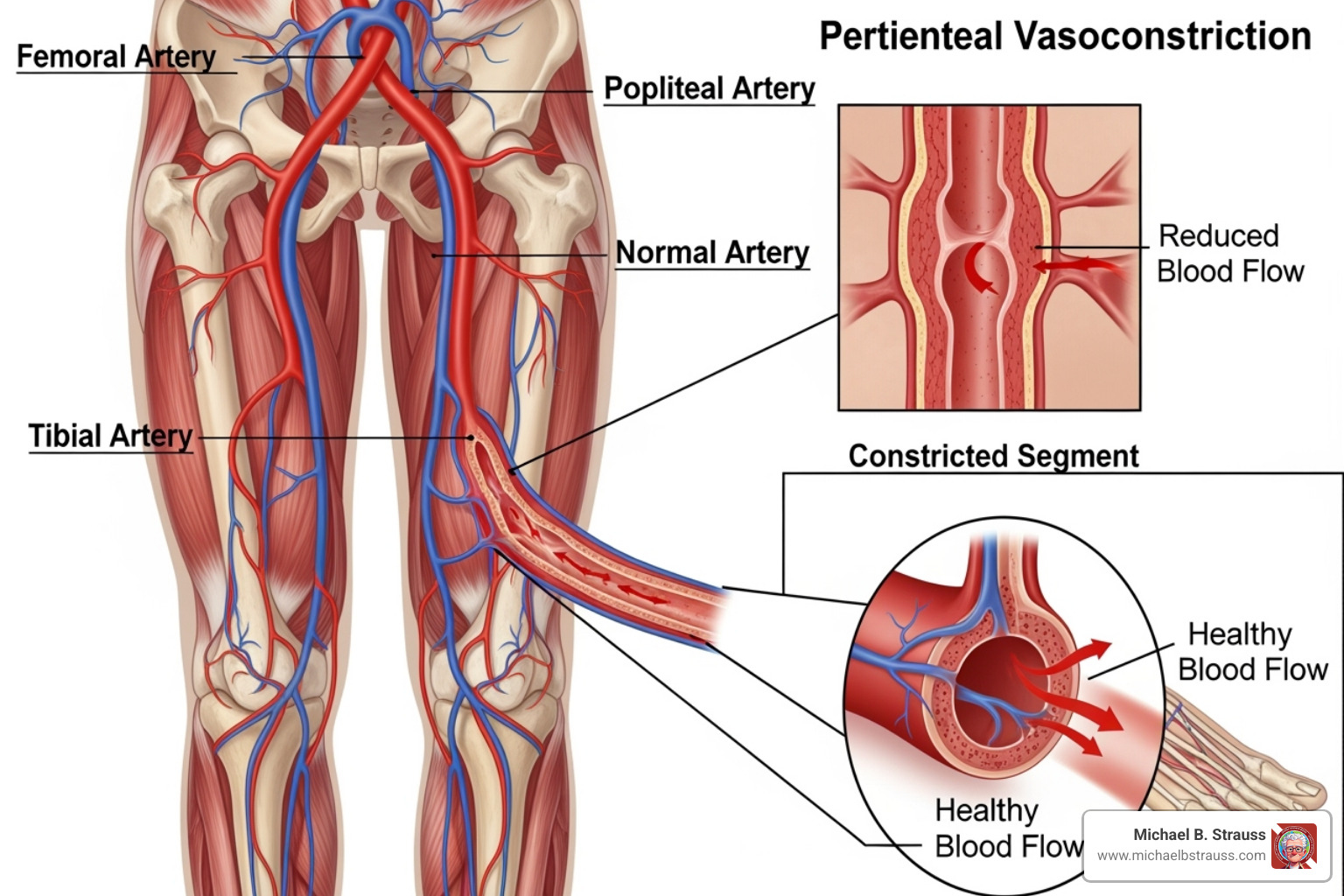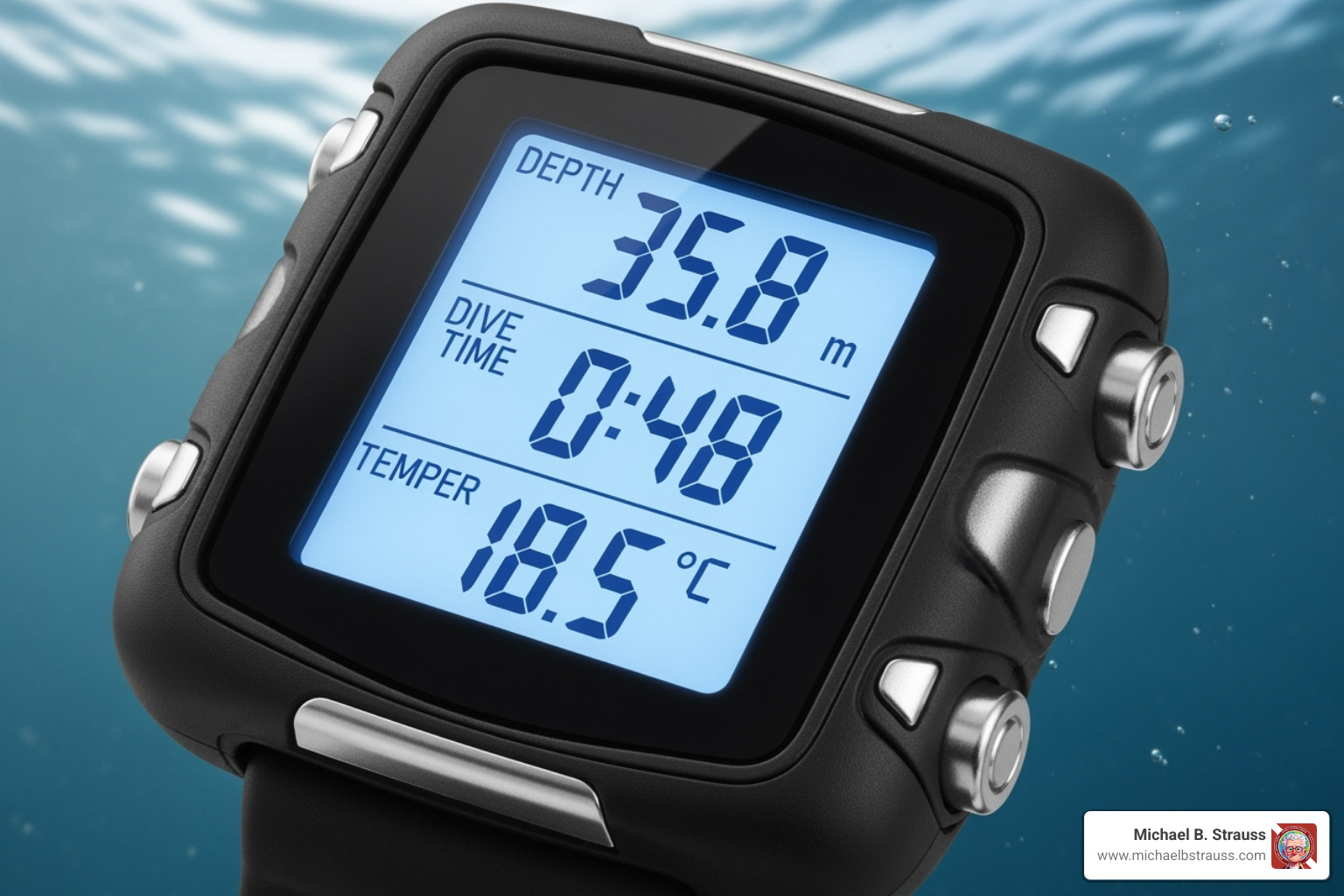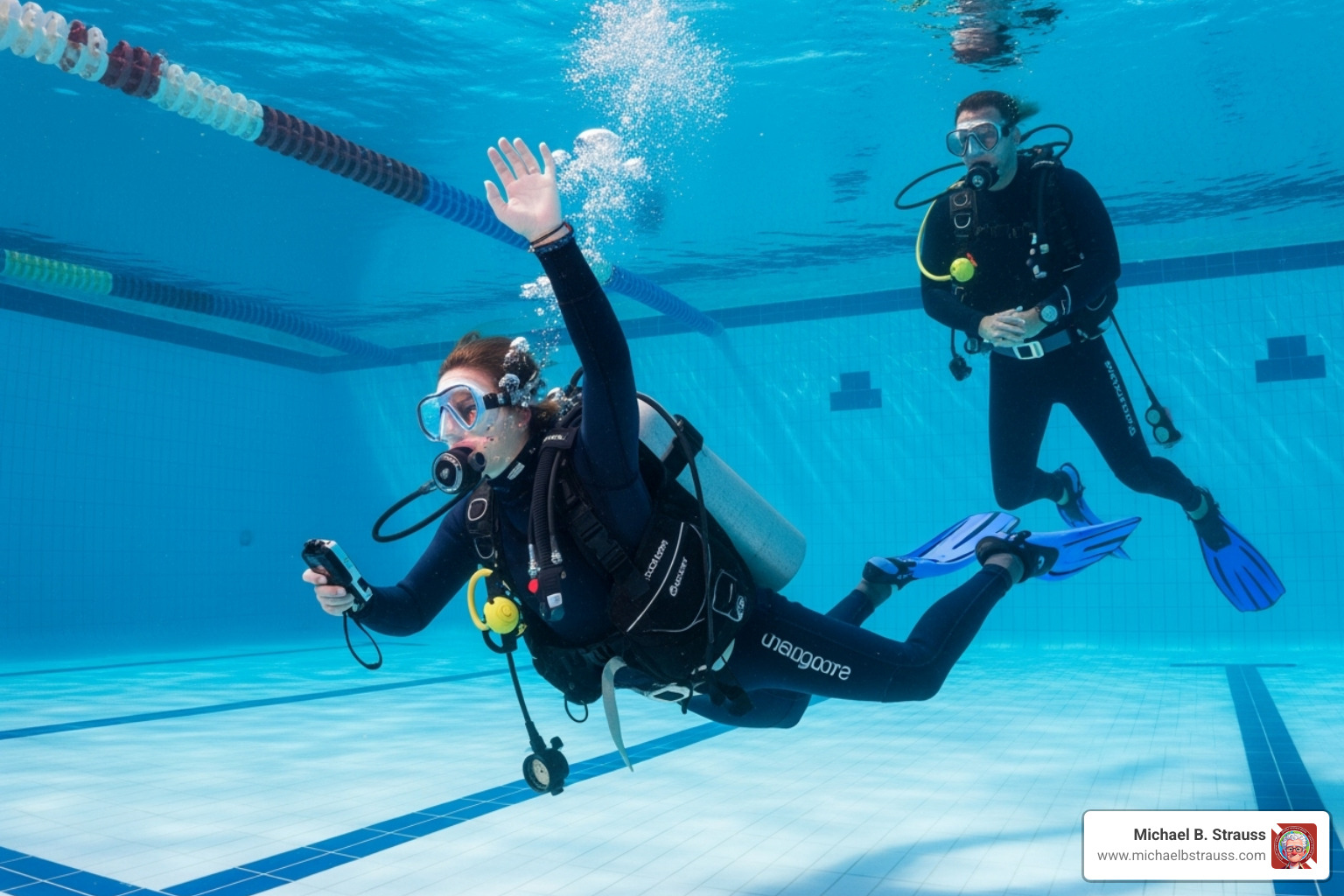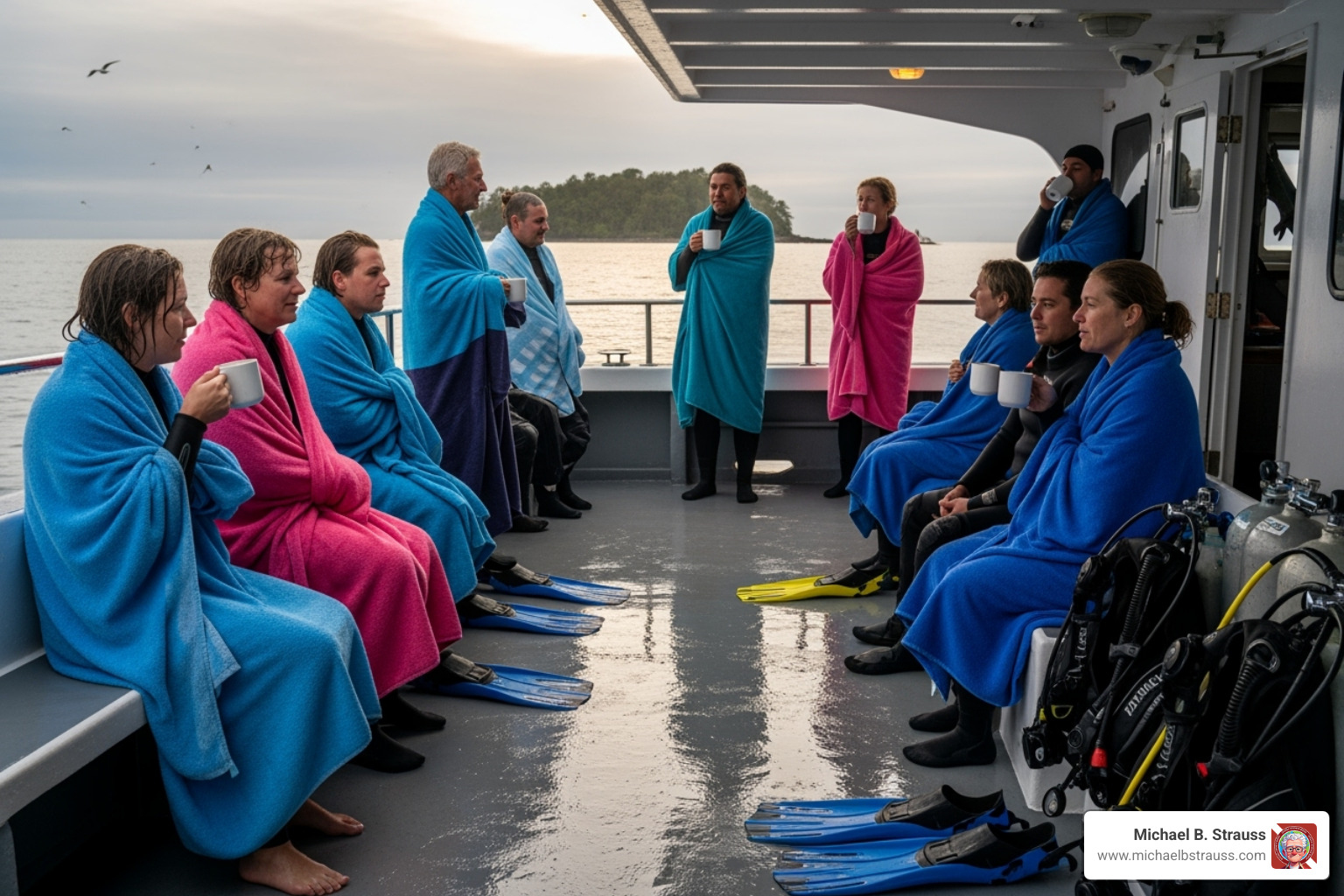The Chilling Reality of Cold Water Diving
The effects of cold water diving go beyond mere discomfort. Entering water below 70°F (21°C) triggers dramatic physiological changes that impact safety, performance, and decompression risk.
Key Effects of Cold Water Diving:
- Cold Shock Response: Immediate gasping, hyperventilation, and rapid heart rate increase.
- Vasoconstriction: Blood vessels constrict, reducing circulation to extremities.
- Hypothermia Risk: Core body temperature drops, even in seemingly warm water.
- Cognitive Impairment: Reduced concentration and slower decision-making.
- Decompression Complications: Altered gas exchange increases the risk of decompression sickness.
- Hormonal Stress Response: Liftd cortisol and other stress hormones.
As one diving medicine expert notes: "Cold stress's primary impact on diving safety is not just hypothermia, but its influence on inert gas exchange and decompression risks."
Research shows that during prolonged cold water dives, core temperatures drop significantly while stress hormones can increase by over 200%. Hand and foot temperatures can approach the threshold for non-freezing cold injury. Simultaneously, the mammalian diving reflex slows the heart rate, creating competing physiological demands that can overwhelm even experienced divers.
Heat loss occurs 25 times faster in water than air, making proper preparation essential. Understanding these effects allows divers to plan appropriately and recognize warning signs before they become dangerous.

The Deep Dive: Physiological and Cognitive Effects of Cold Water Diving
When you slip beneath the surface of cold water, your body doesn't just get chilly – it launches into survival mode. Understanding these profound effects of cold water diving is critical for safety.
Your Body Under Pressure: Thermal Status and Stress Response
The moment cold water hits your skin, your body begins a complex survival response. Your core temperature starts to drop, even in water as warm as 70°F. During a grueling 9-hour military dive in 39°F water, scientific research on the acute stress response during military dive training found divers' core and skin temperatures dropped significantly, with hand and foot temperatures nearing the 50°F threshold for non-freezing cold injury.
To protect vital organs, vasoconstriction squeezes blood vessels in your limbs, forcing warm blood to your core. This triggers a flood of stress hormones like cortisol and salivary alpha-amylase, which can spike by over 200%. The initial cold shock response (gasping, hyperventilation) is countered by the mammalian diving reflex, which slows the heart rate. This "autonomic conflict" puts significant strain on the body. You may also experience immersion diuresis (an increased urge to urinate) and begin shivering as your body burns calories to generate heat.

Decompression and the Cold: A Risky Combination
Cold fundamentally changes how nitrogen moves through your tissues. Vasoconstriction reduces inert gas uptake in your extremities during the dive. The danger arises during ascent or post-dive, especially with rapid warming like a hot shower. Blood vessels open wide, flooding previously constricted tissues with blood, which can trigger bubble formation and increase the risk of decompression sickness.

Your dive computer doesn't know you're cold and can't adjust its algorithm for your physiological state. This limitation requires you to be more conservative. Plan shorter, shallower dives, add longer safety stops, and consider the U.S. Navy's rule: when planning repetitive cold dives, use the next greater depth and time on your tables.
The Cognitive Effects of Cold Water Diving on Mental Acuity
Perhaps the most underestimated effects of cold water diving are cognitive. Cold doesn't just numb your fingers; it fogs your brain.
Impaired concentration, memory deficits, and slower problem-solving are common. Keeping track of depth, time, and your buddy becomes genuinely difficult. Cold hands reduce manual dexterity, making simple tasks like adjusting your BCD frustrating. This increased task loading from just being cold leaves less mental bandwidth for everything else, leading to perceptual narrowing where you might fixate on one problem while missing others.

Practice helps. The more automatic your diving skills are, the more mental energy you have to manage the cold. This is why regular training is essential for cold-water diving safety. Expect to feel mentally fuzzy and need more sleep after a cold dive; your body and brain need time to recover from the significant stress.
Mastering the Cold: Practical Strategies for Safe Diving
With proper preparation, cold water diving can be a safe and rewarding experience, revealing pristine visibility and unique marine life.
Pre-Dive Protocols: Setting Yourself Up for a Warm Dive
Your defense against the cold starts long before you enter the water. Proper thermal protection is your lifeline.
For water below 60°F (15°C), a drysuit with quality undergarments is essential, though it requires special training. For moderately cold water, a thick wetsuit (7mm+) with a vest and a good hood and gloves can suffice. Your head and hands are major sources of heat loss. A pro tip: keep your hood and gloves in warm water between dives.
While heated vests can be tempting, battery failures at depth are a serious risk. Never use chemical hand warmers, as increased pressure can cause them to burn your skin. Aim to be comfortably warm before your dive, but avoid excessive pre-warming, which can negatively affect gas uptake.
Fuel your body's internal furnace with warm, carb-rich foods, and stay hydrated with water or warm drinks. Avoid caffeine and alcohol, which can accelerate dehydration.
Essential Cold Water Diving Gear:
- Drysuit with quality undergarments (or 7mm+ wetsuit)
- Proper drysuit certification
- 5-7mm hood and gloves (or dry gloves)
- Cold-water rated regulators
- Windproof surface gear
- Warm post-dive clothing
- Thermos of hot drinks
- High-energy snacks
Managing the In-Water and Post-Dive Effects of Cold Water Diving
Once underwater, stay alert and adapt your diving style. Watch yourself and your buddy for signs of hypothermia, such as uncontrollable shivering, confusion, or apathy. End the dive immediately if these signs appear.
Plan conservatively: shorter bottom times, shallower depths, and larger gas reserves are critical as your body works harder and consumes more air. Ensure your regulator is cold-water rated to prevent freezing and free-flows, and practice handling this emergency until it's second nature. During safety stops, light finning can help maintain circulation to your extremities, aiding in gas elimination.
The post-dive period is critical. Resist the urge for a hot shower immediately. Rapid rewarming can trigger decompression sickness. Instead, prioritize passive rewarming: get out of your wet gear, dry off, and put on warm, dry clothes and a hat. If active rewarming is needed for more severe cooling, apply gentle heat to the core (torso, armpits, neck) first. Warm drinks can help if the person is fully conscious.

Listen to your body and extend your caution period after cold dives, avoiding strenuous activity.
Advancing Your Cold Water Diving Expertise
Mastering the effects of cold water diving is a journey. Invest in specialty training like a drysuit course, and build experience gradually with shorter, shallower dives. Always engage in thorough dive planning, accounting for increased gas consumption and having robust emergency plans.
Continuous education is key to safety. To deepen your understanding of diving physiology and decompression safety, get your copy of Diving Science Revisited here: https://www.bestpub.com/view-all-products/product/diving-science-revisited/category_pathway-48.html
DISCLAIMER: Articles are for "EDUCATIONAL PURPOSES ONLY", not to be considered advice or recommendations.






